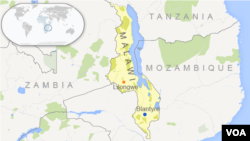Malawi and U.N. agencies have launched an emergency response to the country’s polio outbreak, the first in Africa in five years. The plan includes mass immunization of children under five years of age and intensive surveillance to prevent the virus from spreading further.
The move comes a few days after the country declared a national health emergency after a three-year-old child was paralyzed by the virus, which is the same strain found in Pakistan.
At a press briefing on Tuesday in the capital, Lilongwe, Enoch Phale, Malawi’s Deputy Minister of Health said that despite the fact the strain is imported, there is need for swift action against its spread.
“We are doing whatever we can to ensure that we have broken the infectious circle. One of them is public awareness because its route of infection is two, water and food. And the disease is of global concern; it can affect everybody, including our neighbors.”
Malawi last reported a polio case in 1992. The country was declared polio free in 2005 —15 years before the African continent was declared polio free.
The emergency response plan includes a rollout of mass vaccination campaign for all children under five years of age and disease surveillance across the country.
“But the specific outbreak response is a national immunization campaign targeting all children aged under five with a polio vaccine which is two oral drops, and it will be repeated again in a second round. But what is really, really key is that every under five [child] wherever they are, they are reached. This includes the districts worst affected by Tropical Storm Ana,” noted Dr. Janet Kayita, country representative for WHO in Malawi.
So far, a team of experts and rapid response teams from a nonprofit, the Global Polio Eradication Initiative, have arrived in Malawi. The organization based at the WHO Regional Office in Africa says it aims to support coordination, case tracking, data management, communications, and operations.
The ministry of health says other partner organizations such as UNICEF, USA CDC and Africa CDC have also started sending teams to support emergency operations and innovative vaccination campaign solutions.
Like many other countries in the world, Malawi provides a polio vaccine that targets type 1 and type 3 of the polio virus, following the eradication of polio virus type 2 many years back.
However, WHO says research into the new case in Malawi has shown that the three-year-old child has type 1 and that the child was not fully vaccinated against the disease.
No reason is given for failure to complete polio vaccine, but some health experts cite pandemic-related preventative measures such as social distancing as factors adding to the challenge in getting children vaccinated.
Malawi’s community health ambassador, Maziko Matemba, suggests the need to empower community health care workers with skill to identify polio cases.
“The community system structures need to be operating. Maybe you can observe our community health workers if they are not well supported, they will not be able to identify that we have a problem of unvaccinated individuals in the community which has got this [disease]”
According to the ministry of health, authorities are now working to finalize the budget for all activities to be submitted to the Global Polio Eradication Initiative and other partners for funding the implementation of the emergency response plan expected to start in four- or six-weeks’ time.
